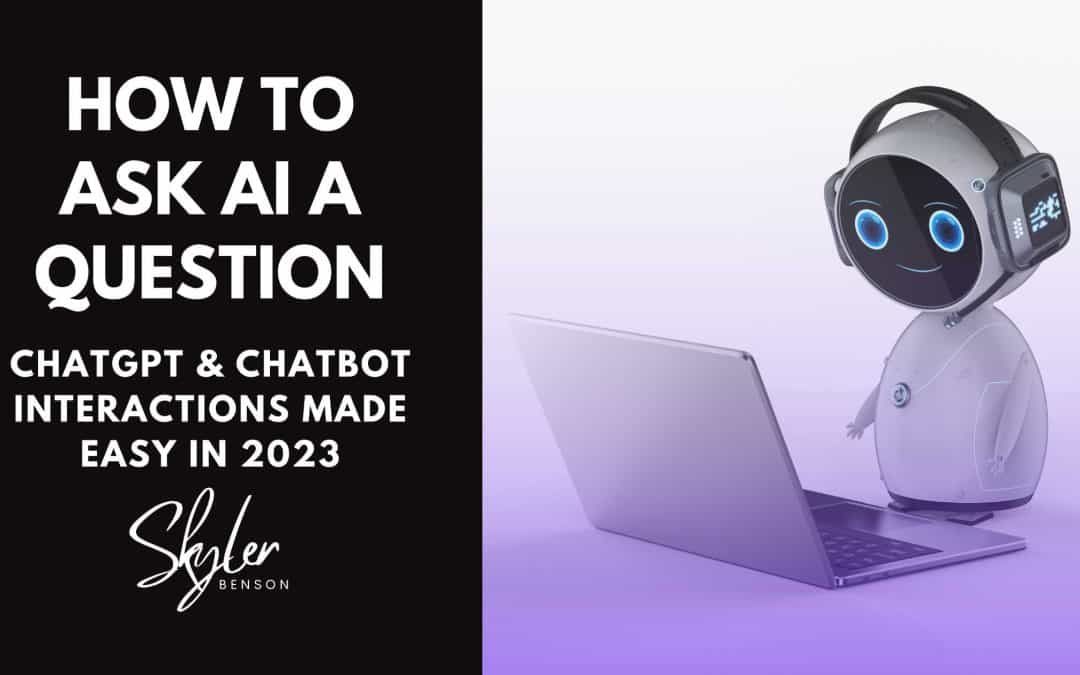Imagine having a conversation with an AI so advanced that it feels like you’re chatting with a human friend! While this was once an experience only possible in science fiction movies, it has become a reality today. Are you curious about how to ask AI a question but need help figuring out where to start?
No worries. If you’re a complete beginner – you’re in the right place!
The future is now, and it is AI.
In this comprehensive guide, we’ll teach you how to master the art of asking AI questions and reveal the secrets to interacting with AI chatbots effectively.
We’ll also help you understand their capabilities and limitations while equipping you with the best strategies to create a productive and enjoyable AI experience.
Whether you’re an AI enthusiast or a curious beginner, prepare to step into the future as we discuss valuable insights, tips, and tricks to help you communicate with and learn how to ask AI a question like a pro.
Let’s get started.
Disclaimer: This post may contain affiliate links. If you use these links to buy something, we may receive a small commission at no extra cost to you. Thanks for your support.
What is AI?
Artificial Intelligence, or AI, is a way to enable computers to think and learn like humans. It simulates human thinking and reasoning by using machine learning and computer systems.
Imagine how you can recognize a friend’s face, understand a story, or solve a puzzle. AI aims to develop similar abilities in computers or software, allowing them to identify images, understand spoken or written language, and make decisions based on patterns or data.
Many apps and tools we use in our everyday lives utilize AI, such as virtual assistants like Siri and Alexa and recommendation systems on Netflix and Spotify.
AI aims to improve our lives by making technology more intelligent, efficient, and helpful.
Different Types of AI
There are many different types of AI.
The most popular are:
Natural Language Processing (NLP)
This kind of AI focuses on understanding and interpreting human language. It can process written or spoken questions, generate content, and provide relevant responses. Hence, using natural language plays a crucial role when you ask a question to an AI bot.
Computer Vision
Computer Vision specializes in analyzing and interpreting visual information from images and videos. While it isn’t directly related to asking questions, computer vision is used with NLP to provide more context or assist in answering questions involving visual elements, such as identifying objects or analyzing images.
Machine Learning
Machine Learning AI systems can learn and improve from experience without being explicitly programmed. Machine learning is essential for AI to understand and answer questions better over time. This is possible because it adapts and refines its responses based on the data it encounters and the feedback it receives.
Why Ask AI A Question?
We know asking an AI a question is now possible, but you may wonder why anyone would want to do that.
Well, asking the AI a question can be beneficial in several ways.
AI chatbots are programmed to provide quick and accurate responses to a wide range of questions. They are a great way of finding information fast, rather than having to look through search engines to find an answer.
They can also assist with scheduling appointments, providing directions, and recommending products or services.
AI can also provide personalized recommendations based on a user’s preferences.
Additionally, asking AI questions can be an educational experience, as it can provide insights into various topics, ranging from science and technology to history and culture.
AI can also generate creative ideas and users with unique perspectives and solutions to problems.
You can also ask ChatGPT chatbot to provide prompts for creating a range of content, from books to blog posts to songs to YouTube scripts.
Asking AI questions can quickly find answers to and provide an alternative to needing to use search engines.
How To Ask Artificial Intelligence A Question: Step By Step
Here are the steps required how to ask AI a question:
1. Choose the Right AI Platform
Before you get started, you’ll need to decide which AI platform to use.
The most popular include:
They all have strengths and weaknesses, so do some research and choose the one that is best for your needs. Then sign up and create an account.
If you have difficulty deciding, I use ChatGPT and Jasper Chat and used them to help write this blog post.
While Jasper Chat is a paid subscription, you can get a free trial with 10,000 bonus credits.
2. Understand the AI’s Capabilities
Before diving in, it’s crucial to understand what an AI can and cannot do.
AI provides information, answers questions, offers recommendations, and generates content.
However, AI isn’t perfect. Its responses are based on the data it has been trained on. While this is constantly improving, it may not always have all the answers or understand every question you ask.
But, by asking certain types of questions, you can significantly improve the responses you will receive.
3. Keep Your Questions Simple and Clear
Now that you’ve chosen your AI platform and know its capabilities, it’s time to ask your question.
Remember, AI is a machine, not a human. So for the best results, make sure you ask questions that are questions simple, clear, and concise.
Avoid using slang, metaphors, or complex sentence structures, as these can sometimes confuse the AI.
4. Provide Context
AI is getting better at understanding context. But to get the most accurate answer possible, you should always provide as much information as possible.
Be specific with your questions and provide relevant background information and details where necessary.
5. Be Patient and Expect Imperfections
AI is continuously improving, but sometimes it doesn’t understand your question or gives an incorrect answer.
If that happens, don’t get frustrated! Instead, rephrase your question or provide more context.
Also, occasionally, you may experience the AI taking longer than usual to respond. If so, be patient.
For example, the AI may have to process a large amount of data or be trying to find the best and most accurate answer to your question, which can lead to a delay.
You can be sure that the AI is working to provide you with a helpful answer, so give it some extra time if necessary.
6. Use Follow-Up Questions
Sometimes, the AI’s response may not fully answer your question, or you need more information. If this happens, feel free to ask follow-up questions.
Doing so helps clarify the answer and allows the AI to learn from your interactions, improving its responses over time.
7. Tips for Interpreting AI Responses
When evaluating AI-generated answers, it is essential to remember some things. They include:
Consider the source: Remember that AI is based on the data it has been trained on. Therefore, if the information is outdated or incomplete, the answer might not be accurate.
When asking for information related to specific dates, be aware that the AI may only provide you with information up until its knowledge cut-off date, which can help you understand the limitations of its responses.
For instance, ChatGPT’s knowledge cut-off date is September 2021, so any information beyond that point might not be available or up-to-date.
For Jasper AI, it is 2019. But Jasper Chat has a new feature that allows it to read information from Google Search Results to provide up-to-date and current information.
Both Bing Chat and Google Bard can also search the internet to provide updated information.
Cross-reference: If you need clarification on an AI’s response accuracy, double-check the information using other sources, such as Google, to confirm its validity.
Ask for clarification: If an AI’s response is unclear or confusing, don’t hesitate to ask for more information or a simpler explanation.
8. Privacy and Security Concerns When You Ask AI Questions
Using AI platforms can raise concerns about privacy and data security. To protect your personal information, you should:
- Read the privacy policy: Before using an AI platform, review its privacy policy to understand how your data will be collected, used, and protected.
- Limit personal information sharing: Avoid providing sensitive or unnecessary personal information when asking questions.
- Use trusted platforms: Stick to well-known and reputable AI platforms prioritizing data privacy and security, such as ChatGPT, Bing Chat, Jasper Chat, and Google Bard. These platforms are committed to protecting user data and maintaining a high standard of AI performance.
If you choose to use third-party extensions or applications that integrate AI chatbots, exercise caution and do your research. Ensure you understand their data privacy policies, security measures, and any potential risks associated with using their services.
What Types Of Questions Can’t AI Answer?
AI Language models have significantly advanced in recent years but face several limitations and challenges.
AI can only answer questions that aren’t any of the following:
1. Subjective or opinion-based questions
AI models don’t have personal experiences or feelings, so they cannot express their own opinions or emotions.
Example: What is your favorite movie?
2. Questions about future events or predictions
While AI can provide educated guesses based on historical data or trends, it can’t predict the future with certainty.
Example: Who will win the presidential election in 2024?
3. Questions that require updated information
AI knowledge is based on training data available only until a specific date.
For ChatGPT, that is September 2021, so it cannot provide accurate information on events, developments, or innovations since then.
Although some AI chatbots can now search the internet and provide relevant and up-to-date information, you should be aware of this for whatever AI chatbot you use.
Example: What was the number 1 most streamed song on Spotify for March 2023?
4. Ambiguous or unclear questions
If a question is unclear or open to interpretation, it can be difficult for AI to provide a precise answer.
Example: What is the best way to get there?
5. Highly specific or niche topics
While AI has a broad range of knowledge, there may be some specialized or niche subjects for which it lacks detailed information.
Example: What are the differences between the enzyme kinetics of two closely related but rare bacterial strains in the process of breaking down a specific substrate?
6. Questions that require personal experiences or interactions
AI does not have personal experiences, senses, or physical presence, so it cannot answer questions about specific personal experiences or sensory perceptions.
Example: How did you feel when you first saw the Eiffel Tower?
7. Ethical or moral dilemmas
AI models are not programmed to make value judgments or determine what is morally or ethically correct. While they can provide information on ethical theories or perspectives, it is important to know that they cannot make ethical decisions on their own.
Example: Is it morally right to use animal testing for medical research
8. Creativity or humor
While AI can generate creative or humorous content to a certain extent, the responses are based on patterns in the data it was trained on and may not be as original or engaging as a human’s.
Example: “Can you come up with a completely original joke that no one has ever heard?”
9. Illogical or paradoxical questions
AI models are logic-based and may struggle to address questions that involve inherent contradictions or paradoxes.
Example: Can an omnipotent being create a rock so heavy that they cannot lift it?
10. Questions involving personal information or privacy
AI models are designed to respect privacy and avoid sharing personal information about individuals. So they cannot answer questions requiring private or personal data access.
Example: What is the home address of the CEO of a particular company?
11. Generalization
AI can struggle to generalize and apply knowledge to new, previously unseen situations. However, this limits its ability to adapt and respond to unique or unfamiliar scenarios.
Example: How would a newly discovered alien species’ circulatory system function if their blood is based on a different liquid medium with unique properties?
Addressing these limitations and challenges is an ongoing focus for AI researchers and developers, who aim to improve AI capabilities and ensure that AI systems are more adaptable, flexible, and context-aware.
Awareness of these limitations can help you ask AI better and more effective questions.
AI and Banned Words/Phrases
AI assistants are designed to be helpful and provide a positive user experience, but certain words or phrases may be deemed inappropriate, offensive, or harmful.
To ensure a safe and respectful environment, AI developers often implement filters and restrictions to prevent chatbots from generating or responding to a query with banned words or phrases.
This approach helps maintain a respectful and inclusive environment for users. It also ensures that AI technology adheres to ethical guidelines and promotes responsible use.
It’s important for users to be aware of these restrictions when interacting with AI chatbots and to strive for constructive, positive communication while keeping in mind the limitations and responsibilities associated with the technology.
So, now that we know how to ask AI a question, and the limitations of AI, let’s look at what types of questions you should ask AI and some examples.
What Kinds Of Questions Can You Ask AI?
You can ask AI a variety of questions.
While it may vary depending on the specific AI platform and its capabilities, here are some common types of questions that AI can provide you with answers for:
1. Fact-based questions:
Any query about general knowledge, historical events, or scientific facts:
- What is the capital of London?
- How far is the Earth from the Moon?”
- Who won the Best Picture Oscar in 2021?
2. Definition questions:
Requests for explanations or meanings of words, concepts, or terms:
- What is astrophysics?
- Can you define ‘cryptocurrency’?
- What is the meaning of the word ‘serendipity’?
3. Recommendation questions:
A query seeking suggestions or advice on various topics:
- What are some good books on mindset?
- Can you recommend some healthy dinner recipes?
- What Netflix Series should I watch if I like Squid Game?
4. How-to questions:
Questions about processes, instructions, or step-by-step guidance:
- How can I improve my credit score?
- What are the steps to change a flat tire?
- How Can I lose weight fast?
5. Comparison questions:
Questions involving comparing different items, concepts, or options:
- What are the differences between a bison and a buffalo?
- Can you compare Mac and Windows in terms of features and user experience?
- What are the pros and cons of dieting vs. fasting?
6. Calculation questions:
Questions that require mathematical operations or conversions.
- What is 35% of 200?
- How many minutes are there in a week?
- If I travel at 50 miles per hour, how long will it take to cover 175 miles?
The AI’s ability to answer questions depends on its programming, training data, and the specific chatbot.
For best results, keep your questions clear and concise, and provide context when necessary.
With practice, you’ll become an expert at asking AI questions in no time!
Can You Ask AI Questions That Are Creative?
Asking creative questions to AI chatbots can be an entertaining way to explore their capabilities and spark interesting conversations. However, it is important to know that the results will vary depending on which AI Chatbot you are using.
You can ask AI anything from writing a song to writing a novel.
Here are a few examples of creative questions you might consider asking:
For example, “Write a song in the style of Avicii.”
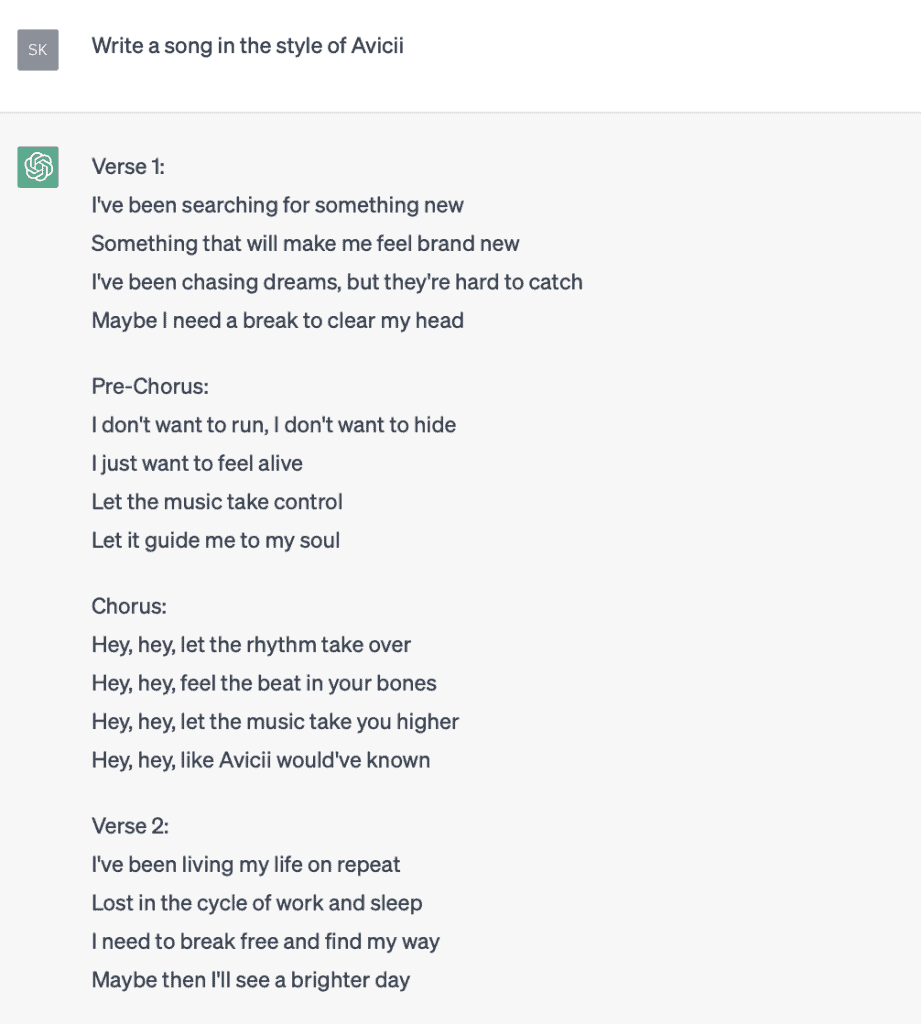

R.I.P. Avicii
Some other types of creative questions you can ask include:
- What would a day in the life of an AI chatbot be like?
- Can you write a short story where the main character is a talking tree?
- If you could invent a new type of ice cream, what flavor would it be and what would you name it?
- Imagine a world where animals can talk like humans. Describe a conversation between a fox and a pig.
- If you had to combine two existing animals to create a new one, which animals would you choose, and what would their hybrid offspring be like?
- What advice would you give to a robot who wants to understand human emotions better?
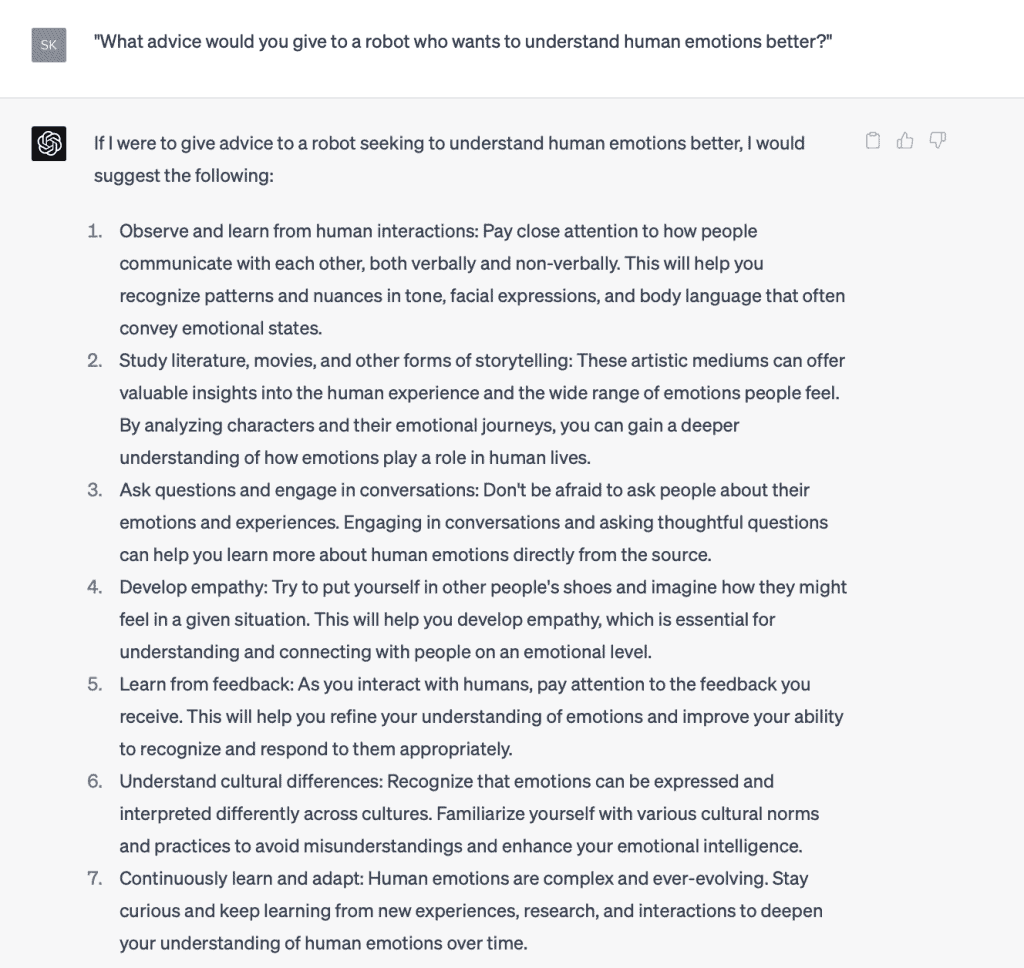
So while AI can understand human emotions, does it have its own emotions?
Does AI have feelings?
AI does not have feelings or emotions. Instead, artificial intelligence is a complex system of algorithms and data processing techniques that enable machines to perform tasks that typically require human intelligence.
While AI can recognize, interpret, and respond to human emotions, it does not experience emotions itself.
Instead, AI’s apparent understanding of emotions results from its programming and training data, which allow it to simulate empathetic responses.
Still, it does not possess the internal, subjective experience of emotions like a human does.
But what about love?
Can an AI fall in love?
No, AI cannot fall in love. This is because AI lacks emotions, feelings, and consciousness – essential components of love.
While AI can simulate conversation, recognize emotions, and even generate responses that appear empathetic, it does not experience emotions, such as love, like a human does.
Any appearance of emotional connection or affection from an AI is simply a result of its programming and training data, not a genuine emotional experience.
What questions should I ask about AI?
If you want to learn more about AI, asking the following questions will help you better understand its capabilities and limitations.
- What is AI?
- How does AI work?
- What are the different types of AI?
- What are some practical applications of AI in various industries?
- What are the limitations and challenges that AI currently faces?
- How does AI learn and improve its capabilities?
- What ethical considerations are associated with AI development and deployment, such as privacy, bias, and fairness?
- How can AI be used safely and responsibly to minimize harm and maximize benefits?
- How advanced is AI research?
- What AI breakthroughs or advancements are on the horizon?
- How do AI systems interact with humans?
- What is the role of conversational AI in facilitating communication?
- How do AI platforms like GPT-3, Google Bard, and Bing Chat compare, and which is best suited for specific tasks or industries?
What is an example of conversational AI?
An example of a conversational AI is OpenAI’s ChatGPT.
GPT stands for Generative Pre-trained Transformer, a powerful natural language processing AI model developed by OpenAI.
ChatGPT is designed to understand and generate human-like text based on its input. It can engage in conversation, answer questions, provide recommendations, and more.
Conversational AI systems like ChatGPT are used in various applications, such as chatbots for customer service, virtual assistants, content generation, language translation, and collaboration.
It is designed to mimic human conversation as closely as possible, making interactions feel more natural and intuitive.
What Is The Best AI To Talk To?
OpenAI recently released ChatGPT-4, a next-generation AI language model that has surpassed its predecessor, GPT-3, regarding its ability to engage in more nuanced, context-aware, and coherent conversations.
Advancements in ChatGPT-4 stem from improvements in the underlying algorithms and architecture. It is also trained on a more diverse, high-quality, and up-to-date dataset.
These enhancements enable ChatGPT-4 to understand complex queries better, provide more accurate responses, and adapt to a broader range of topics and domains.
Furthermore, with increased attention to ethical considerations and a focus on reducing biases, ChatGPT-4 provides more responsible and inclusive interactions, making it the best AI to talk to for a wide array of applications and use cases.
Here is the difference between Chat GPT-4 and Chat GPT-3 answers to questions:
ChatGPT-3 Example:
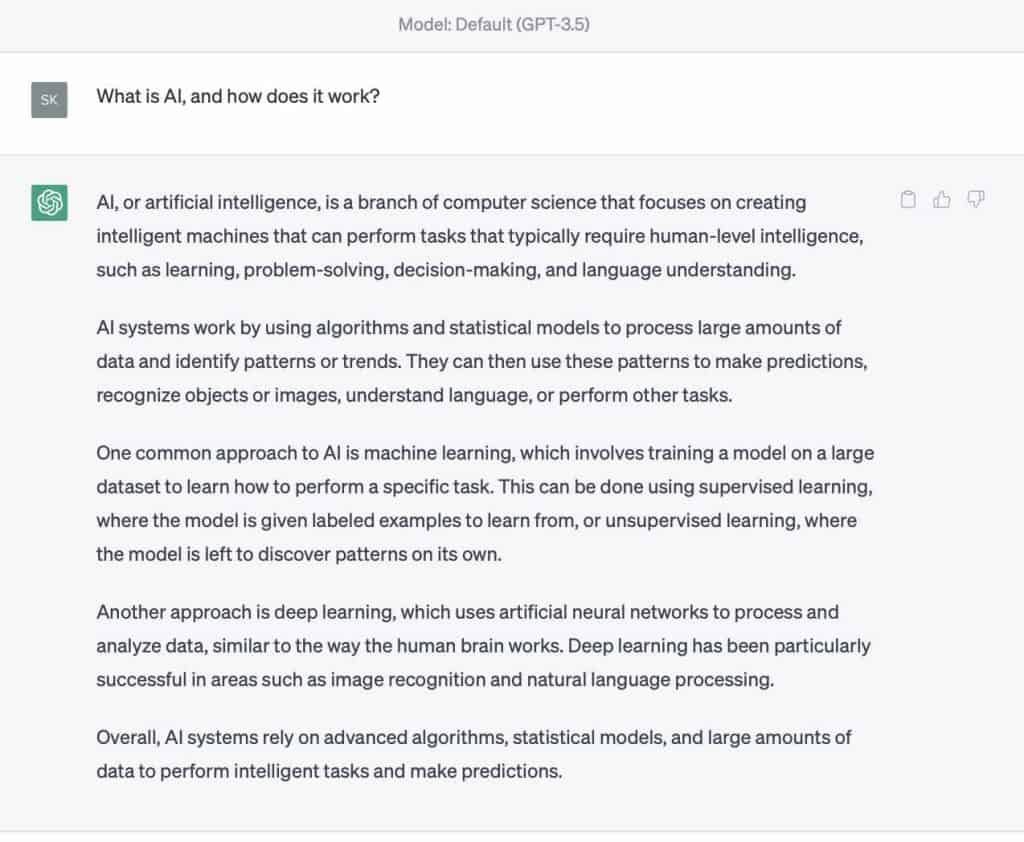
ChatGPT-4 Example:
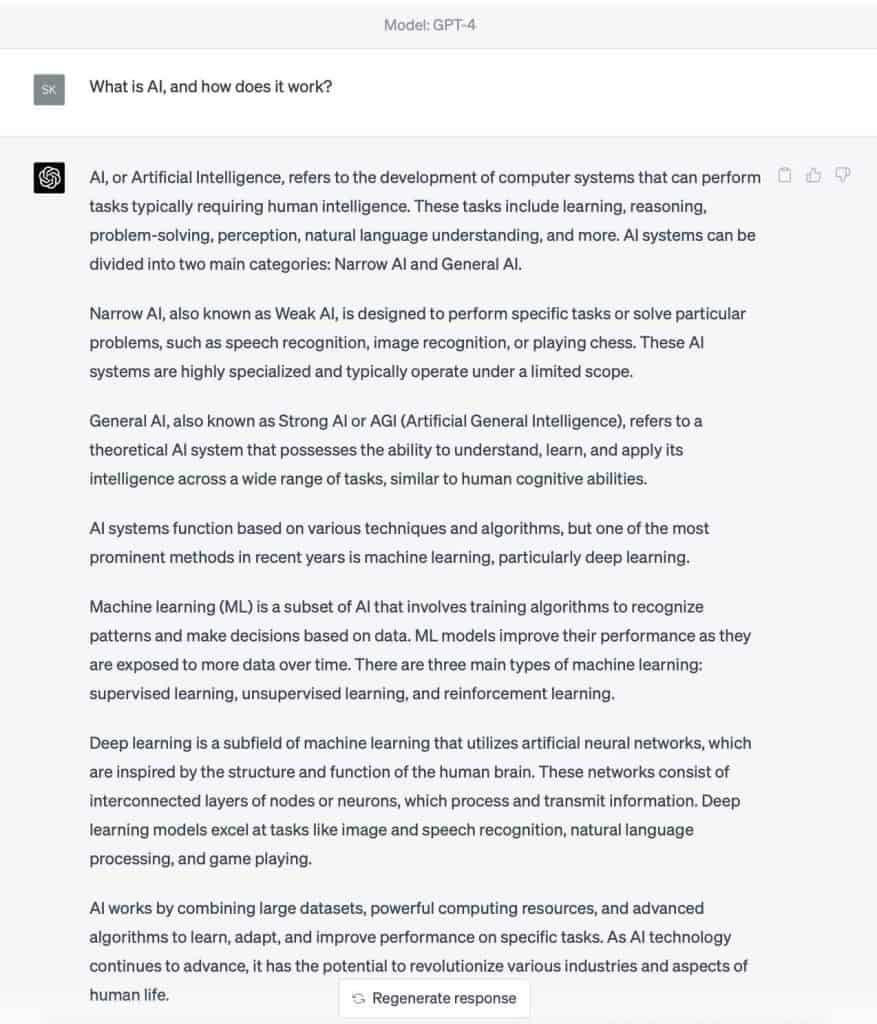
As you can see from the above example, Chat GPT-4 gave a much more detailed answer to the same prompt.
Currently, ChatGPT-4 is only available with a Chat GPT Plus subscription.
However, if you want an answer to current events, Bing Chat, Google Bard, or Jasper Chat are better alternatives, as they can scan search results to include current events in their responses.
Can AI ask questions?
Yes, AI can ask questions. AI systems, especially those designed for natural language processing and conversation, can be programmed to generate questions based on the context of a conversation or a specific topic.
This ability allows AI to interact more with users, clarify details, gather more information, and provide better responses.
AI-generated questions can also be helpful in applications such as tutoring, customer service, and even content generation.
However, it’s important to remember that AI-generated questions are based on their programming and training data rather than on genuine curiosity or personal understanding like a human.
Related Reading on SkylerBenson.com:
Curious about AI generated art? Find out exactly What Is AI Art?
Want to use ChatGPT on your iPhone? Find out how to replace Siri with ChatGPT on your iPhone.
Final Thoughts
With the rapid advancements in AI technology, AI chatbots are here to stay and are only going to become more and more popular. Learning how to ask AI a question is soon going to be a necessary skill to ensure you don’t get left behind.
While there are limitations and ethical considerations to keep in mind when using AI chatbots, we can make the most of this innovative technology by using trusted platforms, asking creative questions, and being mindful of data privacy and security.
Whether you’re seeking recommendations, assistance with tasks, or simply engaging in conversation, AI chatbots provide a fascinating opportunity to interact with technology in a way that was once only possible in science fiction.
Asking AI a question has become an increasingly popular and convenient way to access information and engage with technology. But remember to be patient, expect imperfections, and provide context when asking questions.
With practice, you’ll become an expert at communicating with AI in no time!

